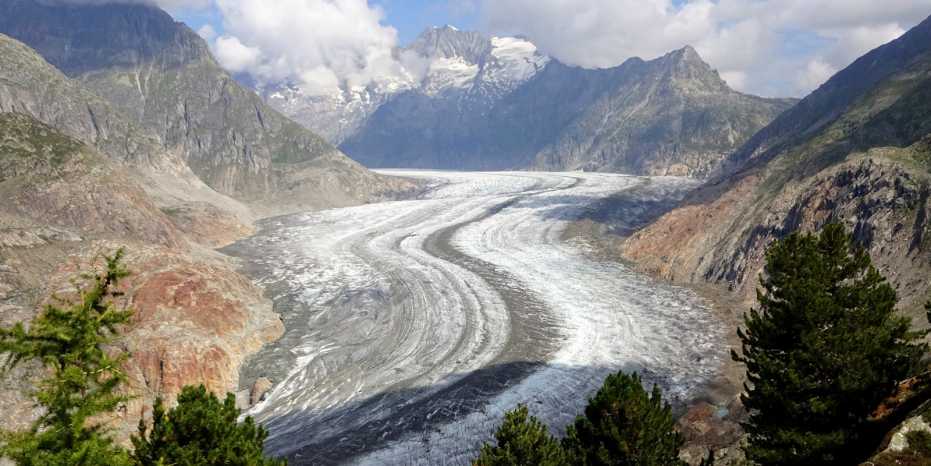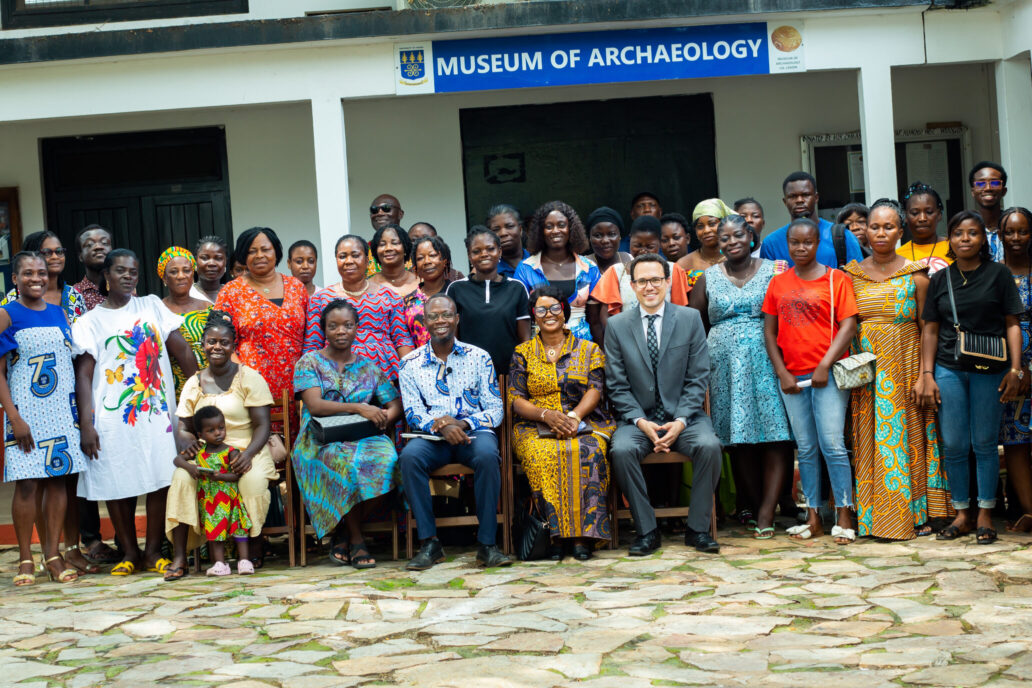Every year, it attracts thousands of visitors from around the world: as the largest ice flow in the Alps, the Great Aletsch Glacier is a major tourism draw in the Swiss region of Upper Valais, second only to the Matterhorn. In the summer, its meltwater plays a key role in providing sufficient water to the dry Rhone valley.
Our glaciers are on borrowed time. This model shows how much
by Felix Würsten, 22 January 2020
The largest glacier in the Alps is visibly suffering the effects of global warming. ETH researchers have now calculated how much of the Aletsch Glacier will still be visible by the end of the century. In the worst-case scenario, a couple patches of ice will be all that’s left.

View of the Great Aletsch Glacier from Moosfluh above Bettmeralp. Even in the best case, any glacier ice can be seen from here in the year 2100. Image: Matthias Huss/ETH Zurich)
Yet as the climate becomes ever warmer, the massive glacier is suffering just as much as the Matterhorn, which is beginning to crumble. The Aletsch Glacier’s tongue has receded by about one kilometre since the year 2000, and scientists predict this trend will continue over the coming years. But how will things look for the Great Aletsch Glacier by the end of the century? How much of it will still be visible from, say, the nearby Eggishorn or the Jungfraujoch?
A precise glacier model
If things go badly, not much. This is the conclusion reached by Guillaume Jouvet and Matthias Huss from the research group of Martin Funk at the Laboratory of Hydraulics, Hydrology and Glaciology (VAW) at ETH Zurich. In a detailed simulation, the two researchers have tested how the Aletsch Glacier will change over the coming years. They applied a 3D glacier model that allows them to map the dynamics of an individual glacier in detail. “The Aletsch Glacier’s ice movements are particularly complex: three massive ice flows coming down from the mountaintops converge at Konkordiaplatz, and then continue on together into the valley,” Huss explains.
He collaborated on a similar simulation 10 years ago with Jouvet, who at the time was working at EPFL. Now the two researchers have teamed up again to assess the future of the Aletsch Glacier using the new regional climate scenarios for Switzerland (CH2018) that were introduced last autumn. They focused on three scenarios that take widely different starting points regarding the concentration of CO2 in the atmosphere and thus also assume different levels of global warming.
The best case: 50 percent loss
Regarding glacier tourism in Valais, the best-case scenario would be if global warming could be limited to less than 2 degrees Celsius, as stipulated in the Paris Agreement. For that to happen, however, greenhouse gas emissions have to be massively reduced around the world, and soon, so that the climate can be stabilised from about 2040. “Even in this case, we have to assume that the Aletsch Glacier will keep retreating until the end of the century,” Jouvet says, continuing, “which means both ice volume and length will be reduced by more than half of what they are today.” Large glaciers are very slow to react to changes in climate, and so even if the global climate does stabilise relatively quickly, the Aletsch Glacier will continue to retreat.
A glacier out of equilibrium
The situation is much more critical if the global community does not pull together quickly to take effective measures against global warming. Assuming an unfavourable (but unfortunately fully realistic) scenario, in which Switzerland’s climate warms up by the end of the century to 4 to 8 degrees hotter than the 1960–1990 reference period, in 2100 all that will remain of what was once the largest glacier in the Alps will be a couple of measly patches of ice. “And Konkordiaplatz, which is directly below Jungfraujoch and still covered in about 800 metres of ice, will be completely ice-free,” Jouvet adds.
In this context, it is interesting to see how much global warming has already impacted the glacier to date: even in a theoretical scenario in which the climate remains the same as it has for the past 30 years, the glacier’s ice volume will still decrease by more than a third by the end of the century. And if the climate remains as it has for the past 10 years, as much as half the ice volume will be lost. “These numbers confirm that the glacier is no longer in equilibrium with the climate,” Huss explains.
Reference
Jouvet G, Huss M: Future retreat of Great Aletsch Glacier. Journal of Glaciology, 2019, Published online by Cambridge University Press: 11 September 2019, doi: 10.1017/jog.2019.52





